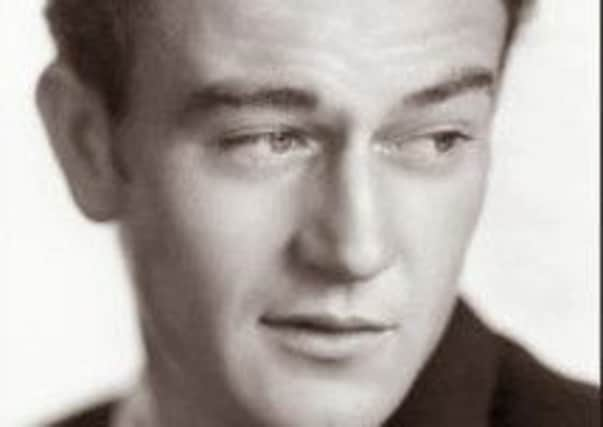Book review: John Wayne - The Life And Legend


John Wayne: The Life and Legend
Scott Eyman
Simon & Schuster, 658pp, £25
I hadn’t directed a movie yet, but John Ford and Hawks – the two most important directors in his career – vouched for me so he quickly became outgoing and pretty candid. When he was finally called away, he said to me, enthusiastically: “Geez, it was great talkin’ about pictures! Nobody ever talks to me about anything but politics and cancer!”
He wasn’t kidding, By the mid-1960s, after 25 years of stardom, most people would mainly talk about John Wayne’s conservative politics, or about his having survived lung cancer, with the loss of part of a lung. Hardly anyone spoke of his acting, except to take it for granted or to minimize it by saying he “always plays himself.” In this authoritative and engaging biography, Scott Eyman writes in great detail on all three subjects: the politics that led Wayne to be actively involved in the Hollywood Red Scare that blacklisted hundreds in the industry; the cancer that ultimately killed him in 1979; and the surprising amount of care and work that went into creating the persona known to the world as John Wayne.
Advertisement
Hide AdThe portrait Eyman paints very much resembles the Wayne I knew for nearly 15 years: affable, guileless, exuberant, even oddly innocent. Hawks, who cast him in Red River (1948), the major role for the second half of his career, once said to me that he felt everything that had happened to Wayne had gone a little “over his head.” Indeed, part of the charm of the man who was born Marion Robert Morrison in Iowa, in 1907, was his lack of self-importance. Among the most interesting things I learned from this book are how well Wayne expressed himself in prose, how cogently he formulated his thoughts and what a good student he was. He had wanted to be a lawyer, and the few writings Eyman quotes are quite impressive, especially because Ford liked to give the idea that his star was an ignoramus.
Eyman opens with an exciting prologue on the famous introductory shot in John Ford’s first sound western, Stagecoach (1939), the picture that catapulted the actor to the A-list overnight. It was a very unusual shot for Ford. It started with a full figure of Wayne, saddle over his shoulder, a rifle in his hand. The camera then rushes into a close-up, and Wayne twirls and cocks the rifle in one flamboyant gesture. This is the movie in which Ford – rejecting the producer’s choice, Gary Cooper – decided to make Wayne a big star; when you see the picture, it seems quite a conscious decision, so much of it being shown from Wayne’s perspective. Although Duke had a minimal amount of dialogue, Ford made a point of always cutting to him for his reaction to whatever was being said or done. I’ve often heard it said that Ford made Wayne a star by giving him very few lines, but that isn’t the point: in pictures, a close-up reaction is worth a million words. Wayne used to sum it up: “They say I’m an action actor, but I’m really a reaction actor.”
Hawks’s Red River was another turning point, prompting Ford to say in amazement:“I never knew the big son of a bitch could act!” In it, Wayne played a character a good 15 or more years older than he actually was, a single-minded man obsessed with a dangerous and exhausting cattle drive. It became the foundation for a series of performances that were a considerable distance from the easygoing good guy he had been accustomed to playing up to then.
The star on the screen wasn’t really him, and he was always clear about the difference. In 1957, at the height of his fame, he said: “I never will be a film personality like John Wayne. I know him well. I’m one of his closest students. I have to be. I make a living out of him.”
Although he managed to avoid military service in the Second World War (for which Ford endlessly mocked him) on the screen he won that war in a big way. I remember seeing Sands of Iwo Jima when it opened in 1949; aged ten, I was shocked by the ending, when Duke gets shot in the back by the enemy and killed. It was one of the few times Wayne died in a movie. He usually seemed altogether indestructible, like the legend he still is.